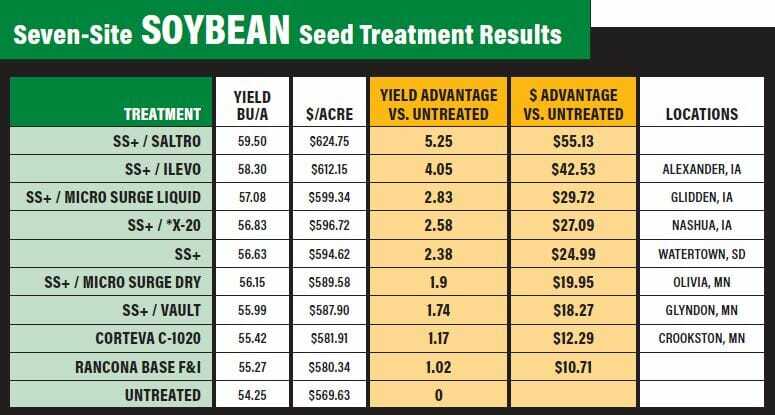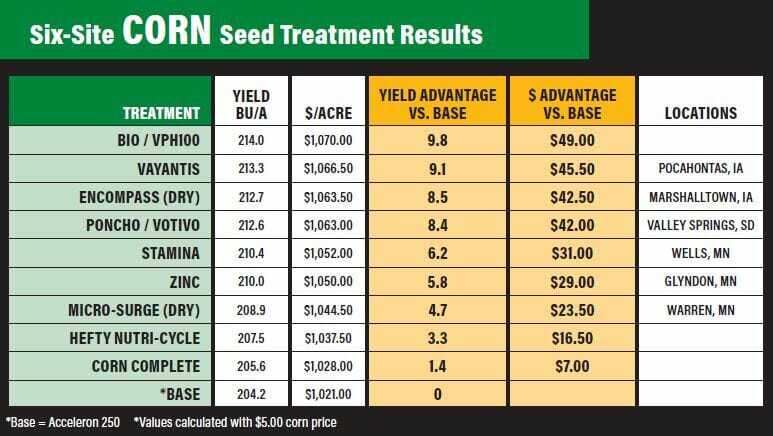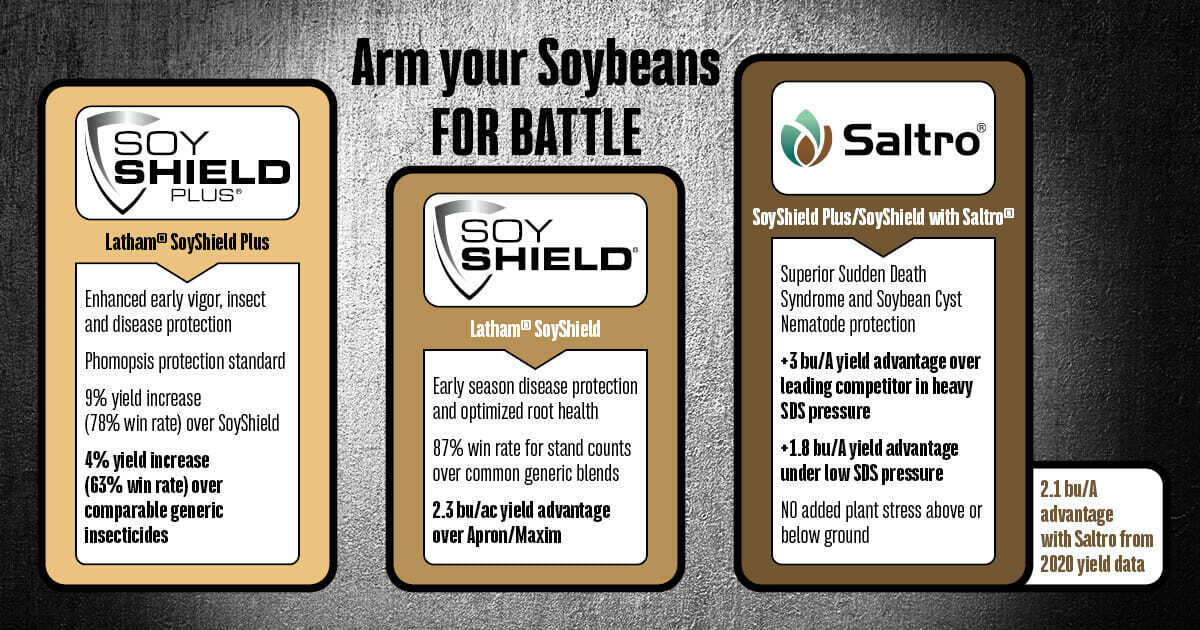Latham Seeds adds new Vayantis® to SoyShield® Plus! On this week’s #AsktheAgronomist, Phil Long, precision agronomy advisor, and Matt Moore, soybean product manager, discuss soybean treatments and how the addition of Vayantis is really exciting going into the 2022 planting season! Learn more about Vayantis fungicide.
-
Latham Hi‑Tech Seeds
#AsktheAgronomist – Latham Adds Vayantis

-
Latham Hi‑Tech Seeds
Free Throws Total $65k Donation from Latham Seeds
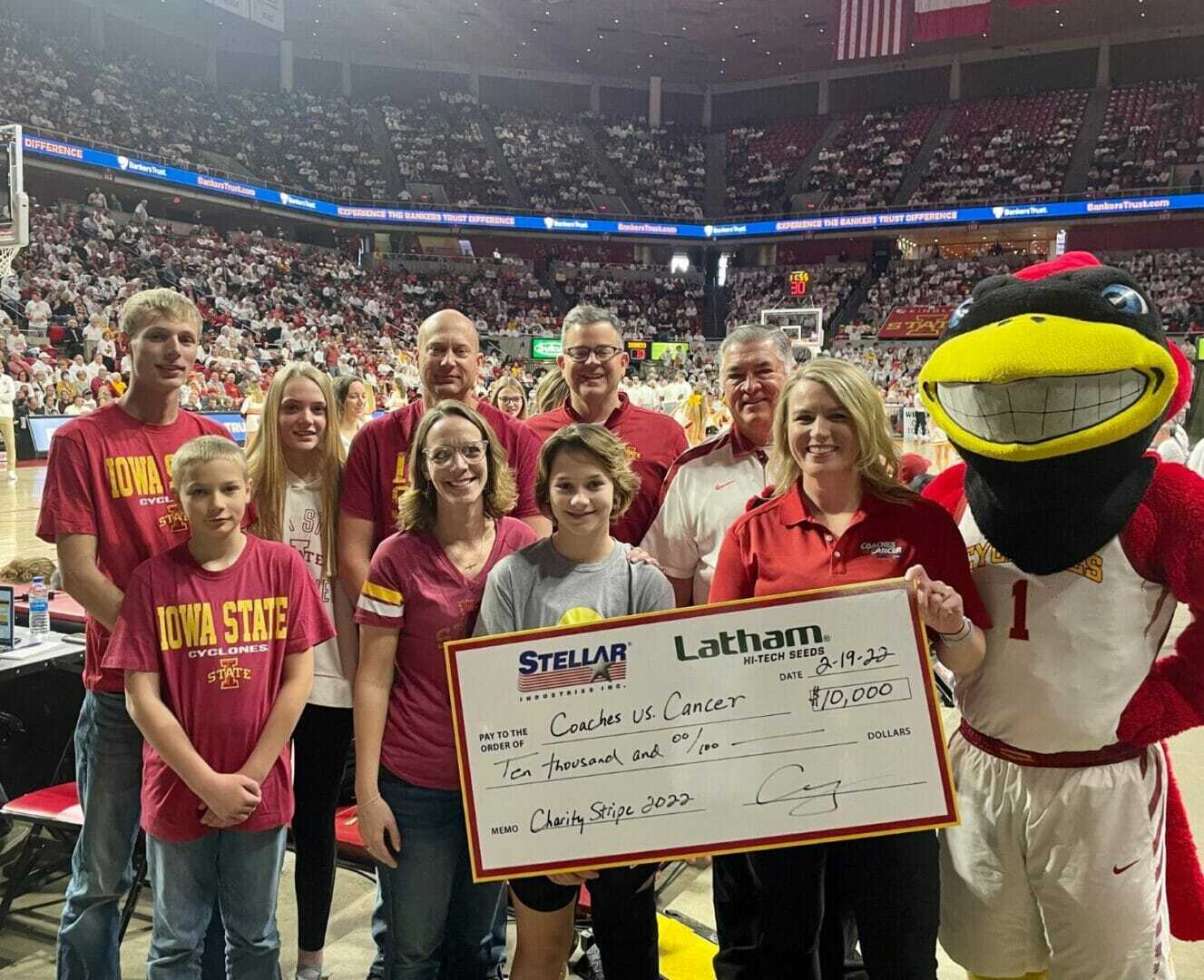
Each time a member of the men’s basketball team at the University of Iowa or Iowa State University stands at the free throw line the American Cancer Society has a shot at winning. For the 10th consecutive season, Latham Hi‑Tech Seeds has teamed up with Cyclone Sports Properties and Hawkeye Sports Properties to donate funds to the American Cancer Society through Coaches vs. Cancer. Over the course of 10 years, Latham Seeds has donated $65k.
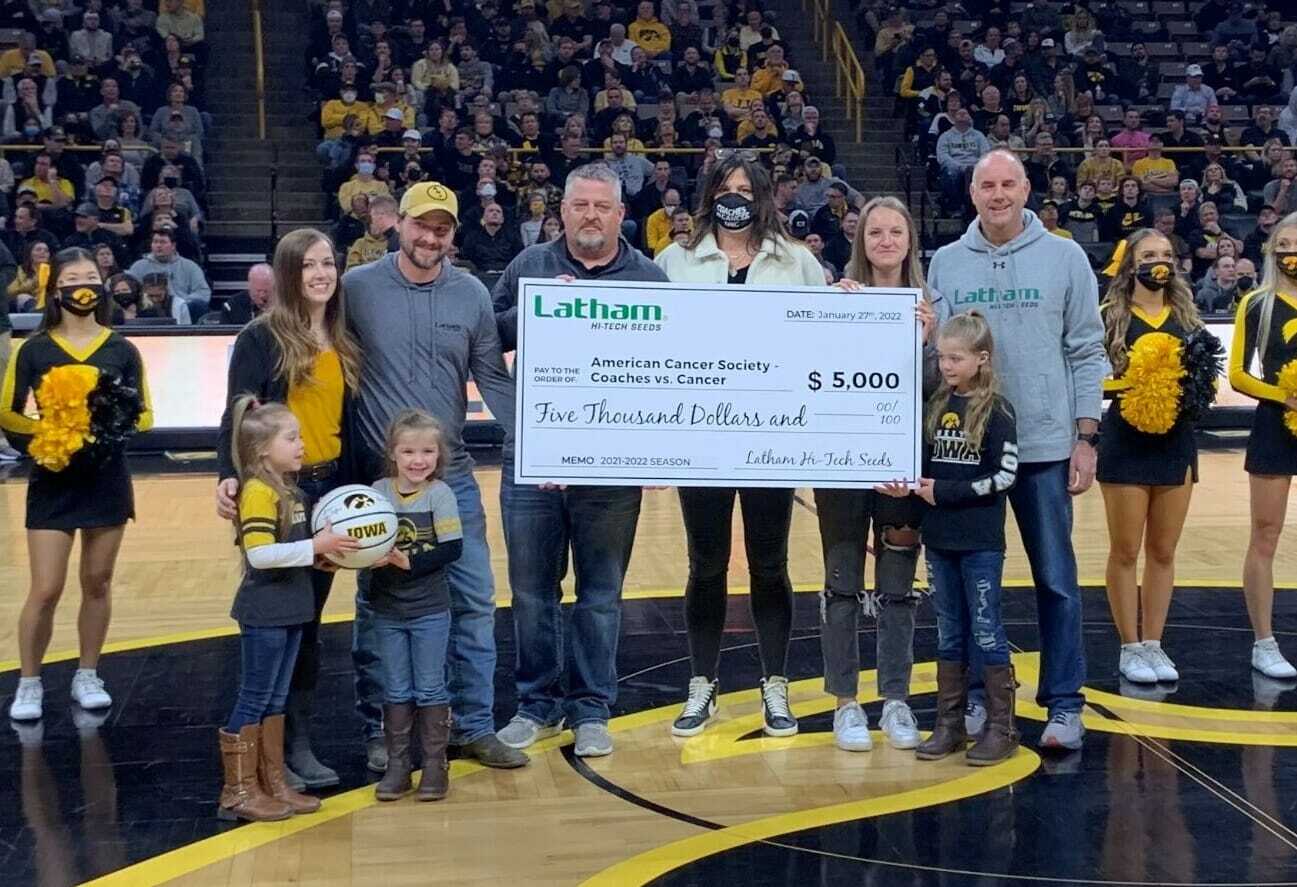
2022 Iowa Hawkeye Charity Stripe Check Presentation. 
2022 Iowa State Cyclone Charity Stripe Check Presentation. Coaches vs. Cancer was championed by Norm Stewart, former head coach of the University of Missouri men’s basketball program. As a cancer survivor and member of the National Association of Basketball Coaches (NABC), Stewart challenged fans to pledge a dollar amount for points made by his team. The American Cancer Society and the NABC adopted that concept in 1993, transforming it into a nationwide effort to provide help and hope to people facing cancer.
“We have been committed to supporting the American Cancer Society through the Charity Stripe Promotion since 2013 because we know first-hand what a gift hope can be,” says John Latham, president of family-owned Latham Hi‑Tech Seeds in Alexander, Iowa. “On February 20, 2010, my father underwent a stem cell transplant to battle AML (Acute Myelogenous Leukemia). He and my mom moved into the Gift of Life Transplant House in Rochester after he was released from the hospital. That transplant extended Dad’s life for more than five years, and we are grateful for all of the support he received during his cancer battle. I also grateful that my mom is a two-time cancer survivor.”
Whether it’s ourselves, our parents, a neighbor or a coworker, each of us has a cancer story. More than 1.6 million people are diagnosed with cancer annually in the United States. No one fights alone.
Related Articles:
- 2013: Coaches vs. Cancer nets $15,000
- 2014: Coaches vs. Cancer nets $17,000
- 2015: Put the Full Court Press on Cancer
- 2016: Will to Win is a Common Denominator
- 2019: Latham Seeds Provides Cancer Support One Free Throw at a Time
- 2020: Providing Hope is Our “Why”
- 2021: Coming Back from Childhood Cancer
- 2021: Schminke Family Goes the Distance
-
Latham Hi‑Tech Seeds
#AsktheAgronomist – Dicamba Tips
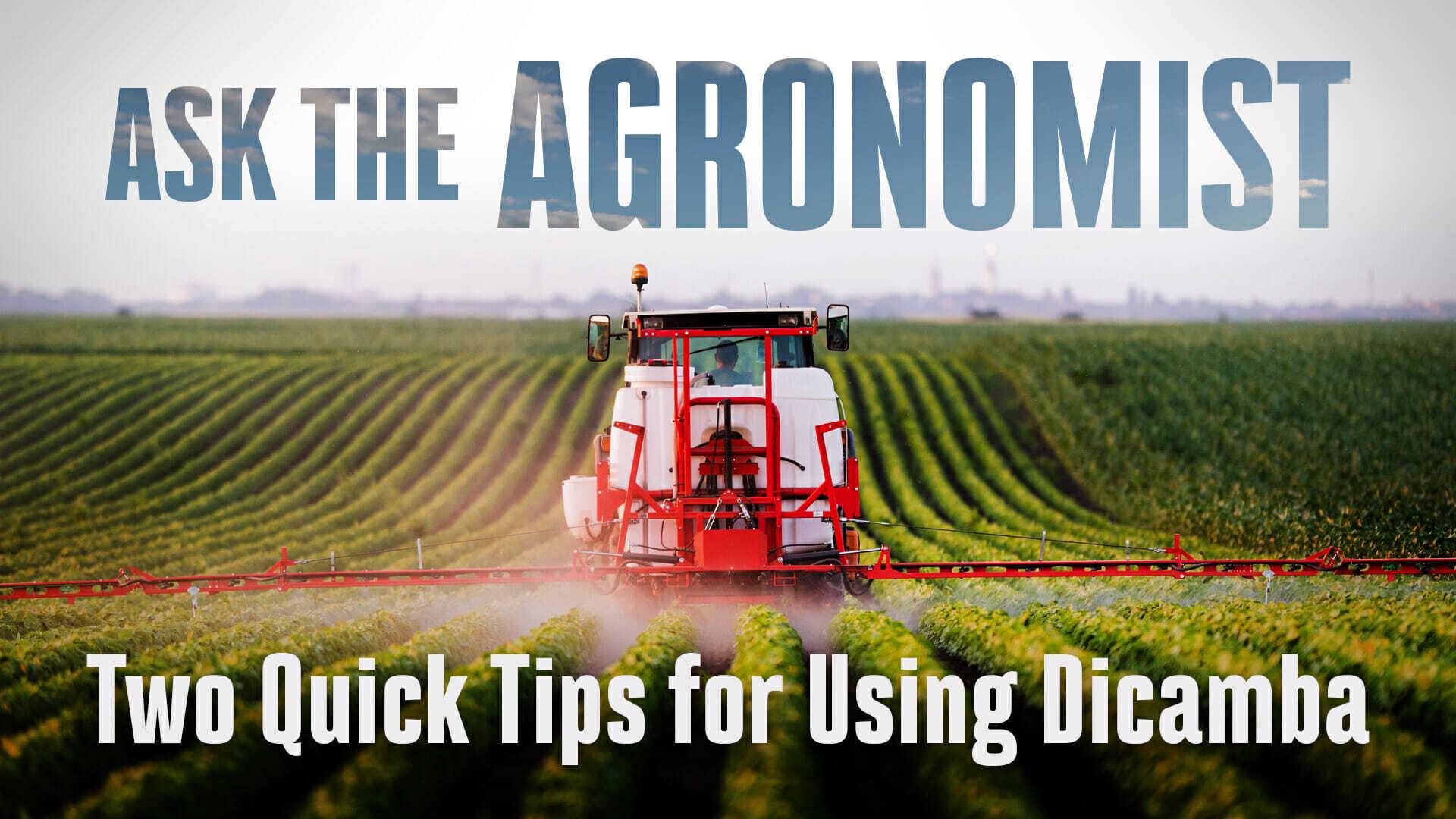
Phil Long, precision agronomy advisor, dives into Dicamba and highlights ways it can be affective in your herbicide regime. Subscribe to our YouTube channel and stay up-to-date with agronomy news in the industry.
-
Latham Hi‑Tech Seeds
Latham Dealers Savor Meals and Music in Jamaica

When you step onto the warm, white sand beach at Secrets Wild Orchid in Jamaica and overlook the beautiful waters of Montego Bay, your worries melt away. It sounds cliché, but it’s true. As you breathe in the delicious smells of chicken grilling at the Jamaican jerk shack near the pool, you crave your next meal – regardless of what time it is.
Time is savored as much as the meals and the music on this laid-back island in the Caribbean.

“Although we stayed in a beautiful four-star, all-inclusive resort with bottomless food and drinks and endless entertainment, it was really our people who made this trip so memorable,” says Amy Rohe, sales manager for Latham Hi‑Tech Seeds. “The first night literally set the stage for our group. The band was amazing, and band members invited some of us onto the stage. We weren’t just listening to their performance. We were part of it! ‘Creating amazing customer experiences’ is something we strive to do at Latham Seeds, but this was better than we even imagined.”
Many people in our group got to meet Latham® dealers from other states the first evening. During our breakfast / orientation meeting the following morning, Amy encouraged everyone to meet someone new from another state.

John Latham, president, welcoming the Latham Team. “It was super fun to see friendships form between dealers from other states throughout the five days,” says Amy. “By the night of the talent show, Team Latham showed up in full force to cheer on one of our own dealers.”
The talent show at Secrets Wild Orchard provided amazing entertainment. It included fire dancing, which was so dangerous that it made you nervous to watch. At the same time, you didn’t want to look away because it was so intriguing. There were talent acts performed by some of the resort’s employees, as well as by resort guests.
“The resort guests, who were competing in the final round of the talent show, had the chance to win a three-night stay at the resort. The competition was close between the finalists – especially between a lady who sang an iconic Whitney Houston song and a Latham dealer,” says Amy. “We were all so excited when our dealer was named the winner!”
Jake experienced more than 15 minutes of Jamaica fame as the band invited him back to the stage during Latham Seeds’ beach party, which was held the night before our group departed.
“When Jake took the stage, our entire group got up and danced while he played. It’s moments like this that turn a great trip into an amazing one!” says Amy. “The beach setting at sunset was spectacular. We could smell the ocean and the delicious food. We were listening to really good reggae music and then… Boom! We were dancing to familiar American songs played live with one of our own dealers being featured on the drums. It really doesn’t get any better than that!”
After five days in paradise, Latham Team members packed their complimentary bottle of jerk sauce and headed home to the Midwest tundra. We’re sharing a recipe to create your own jerk sauce at home, so you can take your taste buds on a Caribbean vacation. Special thanks to the Iowa Turkey Federation for sharing this recipe with us. You might also want to check out links to these two blogs for ideas on rice side dishes:
If you are interested about becoming a Latham Dealer and learning more about dealer perks call: 1.877.465.2842.
-
Latham Hi‑Tech Seeds
With Fertilizer Prices Rising, Nitrogen Credits are Golden
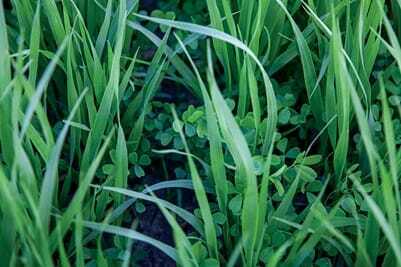
Fertilizer prices have put a lot of pressure on farmers to find creative ways to navigate the nutritional demands for the upcoming corn crop. Depending on the alfalfa stand health, farmers could capture 100 pounds of nitrogen per acre. That’s why many are considering an early rotation of alfalfa fields in 2022.

Farmers who raise alfalfa have an opportunity to capture nitrogen credits and to also capture more yield. Research shows a 20% increase in yields for the subsequent crop planted onto those acres. A mature alfalfa tap root can grow down 20 feet, creating a channel that allows the newly developing root to easily access critical moisture.
With commodity prices increasing, the goal should be to leave no yield in the field. Focusing on high-yielding alfalfa will vastly improve the productivity of all crops. It raises the yield ceiling of corn and soybeans in the traditional corn-soybean rotation upwards of 20% while improving the soil.
Alfalfa Seeding Establishment
Reviewing stand establishment details are important for the success of your alfalfa crop:
- Soil pH. Soil pH is important to quickly establish the nitrogen-fixation bacteria. For best performance, try to maintain a soil pH of 6.8 to 7.2.
- Seeding Rate. Although alfalfa is typically seeded at a rate of 16 to 20 pounds per acre, I encourage farmers to experiment on their farm. Simply double seed during one or two passes. More seed equals more plants. To run a successful trial, remember to apply a bit more fertilizer where plant populations are higher. You likely will be surprised with the life of stand. Latham Seeds has partnered with some innovative farmers to conduct replicated seeding rate trials on their farms, and results have been impressive! We have seen a multi-year yield advantage for higher seeding rates. During the first seeding year, our growers have seen an advantage of one-half dry matter (DM) ton and almost one full DM ton advantage in the second year. One ton of high-quality alfalfa is the Midwest is currently valued at $300.
- Seed Bed/Seed Depth: A firm seed bed is critical to properly placing alfalfa seed at ¼ inch and no deeper than ½ inch.
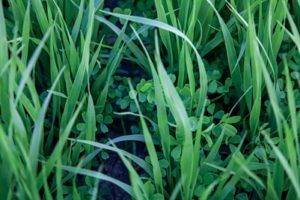
- Companion Crop: Use caution when seeding alfalfa with a companion crop. The key is to not plant companion crops so thick that they actually compete for the critical soil moisture the alfalfa seedling desperately needs. I like a lower to medium rate of oats, say 1 to 1.5 bushels, depending on soil type. Oats emerge quickly, which helps shield the delicate little alfalfa seedling from the intense spring sun. The oat roots also help hold soil in place during intense spring rains. In addition, oats tend to help reduce weed pressure.
Including high-yielding Latham brand alfalfa in your crop rotation is using a new interstate to increase soil biology and help meet nutrient demands of rotational crops. Research has shown that corn planted on rotated alfalfa can help unleash more of the genetic potential yield.
Want to chat more about adding alfalfa into your rotation? Reach out to your dealer or reach out to me, Corey Catt, forage product manager, at coreyc@lathamseeds.com.
-
Latham Hi‑Tech Seeds
#AsktheAgronomist – Why are Chelated Fertilizers Important

On this week’s #AsktheAgronomist, Phil Long, precision agronomy advisor, unpacks chelated fertilizers and why they are important. Learn how they are absorbed and how it can benefit soils with high pH in Latham Country.
-
Latham Hi‑Tech Seeds
Be North Dakota Legendary
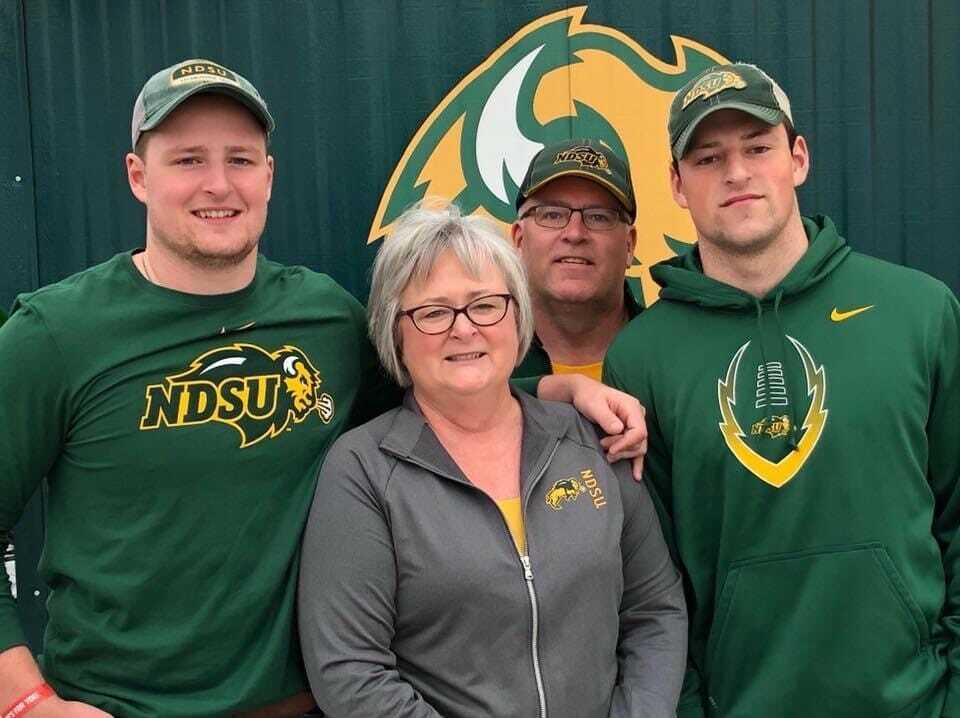
“North Dakota Legendary” is more than a tourism slogan for the State of North Dakota. It’s a way of life.
North Dakota State University’s (NDSU) football team has won 17 national championships. The Bison are a dominating force in FCS, having won nine titles in 11 seasons. Most recently, North Dakota State crushed Montana State on January 8, 2022.
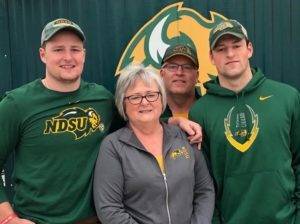
The Hankey Family “Our oldest son, Abraham, played quarterback throughout his high school football career. Our youngest son, Jackson, played full back and middle linebacker in high school. They won the Class A High School Championship in 2014, and we thought, ‘It can’t get any better than this,” says Dave Hankey, a fourth generation farmer and owner of Hankey Seed Co. in Park River, ND.
Upon graduating from Park River High, Abraham followed in his parents’ footsteps by majoring in Agricultural Economics at NDSU. Jackson planned to do the same, but he also had the goal of playing football at NDSU. Jackson never considered attending another college or playing football anywhere else. You might assume success came easily if you only read the headlines like this one, “Hankey leaving NDSU as one of its best defensive players.

Jackson Hankey with his NDSU Teammates Jackson’s story is one of perseverance. Despite being a standout high school athlete, he began his Bison football career as a walk-on. Jackson earned academic scholarships, but it took him two years to earn a football scholarship. As quarterback of the defense, he had to learn the Bisons’ complex defensive scheme. Jackson didn’t play at all his freshman year. After his freshman red shirt year, Jackson became the backup middle linebacker in his sophomore year.
Year three on the NDSU football team was a turning point for Jackson. He became a three-year starter and two-time team captain. He was part of four national championship teams during his five years at NDSU. He holds a Top 10 spot for career tackles at NDSU.
The highlight of Jackson’s football career was 2019-2020 championship game where he won the Elite 90 award, which is given to the athlete with the highest grade point average (GPA) in each of the NCAA’s national championships. Jackson also was the leading tackler at the 2019 national championship game. For the 2021 season, Jackson was among the 50 student-athletes selected to the Football Championship Subdivision Athletics Directors Association (FCS ADA) Academic All-Star Team. He started all 14 games during the 2021-2022 season and was NDSU’s leading tackler for the third straight season.
While many people expected him to continue his football career, Jackson feels called to do something else. He graduated in 2020 from NDSU with a bachelor’s degree in Agricultural Economics. While playing football this past year, Jackson has been working toward a Master of Business Administration (MBA). He’s four classes away from earning his MBA, but Jackson is focusing his attention on theology as he plans to enter ministry. He also is engaged to marry Mikayla Koenig (pronounced co-neg), a member of the NDSU women’s cross-country team. They met through Fellowship Christian Athletes (FCA).
Continuing Education
Gaining life experiences and engaging in life-long learning is what the Hankey family does. After graduating from NDSU in 1985 with a degree in Ag Economics, Dave Hankey earned his MBA from the University of Santa Clara. He worked for a few years in San Francisco before he grew tired of the traffic.
“I couldn’t afford to live downtown, so I had to commute. I got on a train at 6:30 a.m. for an 8 a.m. job. That was a good experience to try something different, but I was always interested in keeping our farm in the family,” explains Dave, who returned to North Dakota when he was 25. “My dad and his brother farmed together for years, and my uncle didn’t have anyone to take over for him.”
“We built our seed processing facility in 1987,” adds Dave. “Our operation was very time and capital intensive at the time because we were also raising potatoes in North Dakota, Minnesota and Illinois. I was spending a lot of time overseeing production crews, but that wasn’t my passion.”
When his father fully retired in 2003, it was time to reevaluate the business. Running a multi-state potato business was taking Dave away from his wife, Jana, and their two sons. He wanted to focus on seed production, which he enjoyed. It also allowed him to be home every night. Win-win.
“We raise wheat seed, soybean seed, sugar beets and corn/canola depending on the year. We also process soybeans and wheat,” says Dave, who once again finds his family’s farming operation in a transition as his oldest son Abraham makes plans to return to the family’s agricultural business.
After graduating with a degree in Ag Economics from NDSU, Abraham earned a degree from the University of North Dakota (UND) Law School. His long-time girlfriend, Haylee Borgen, also is a UND law student. Abraham plans to return to the farm after he passes the bar exam. He has a passion for farming, especially precision farming. Abraham also likes to travel, golf and bow hunt.
“We’re looking forward to having Abraham take on more of the day-to-day responsibilities,” says Dave, who plans to spend more time traveling with Jana during the winter months. “There are just some people you work well with, and Abraham and I work well together. We speak the same language. He understands what I want done, and he is able to communicate that better than I can to our employees. He’s a better communicator than I am, so it will be interesting to see how this all works.”
Hankey Seed Co. also is transitioning away from North Star Genetics, where Dave was a shareholder and owner for more than 20 years.
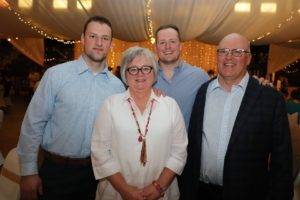
Left to Right: Abraham, Jana, Jackson and Dave Hankey “We were looking for a seed partner that could offer us access to both Enlist and Xtend,” says Dave. “The more we researched family-owned Latham Hi‑Tech Seeds, the more we liked what we saw. We interviewed a couple other seed companies, but we chose Latham Seeds for a couple of reasons. Latham has proven performance, and we can process the seed that we grow. We appreciate that Latham Seeds is a family-owned, Midwest-based company. We’re looking forward to learning more about Latham and growing together.”
When the Hankey family isn’t in the farm field or at the football field, they enjoy sitting down to meals together. Today they’re sharing with us one of their family’s favorite recipes: Spaghetti Pie.
-
Latham Hi‑Tech Seeds
2021 Research Trials Show Seed Treatment Pays

Advertisements and magazine headlines tout the opportunity to enhance yields through plant protection and the use of biologicals or naturals, but does it pay to use these products? Our research once again confirms that seed treatments are an investment that provides a return.
Latham Hi‑Tech Seeds expanded its 2021 research trials to include seed treatments and biologicals. We wanted to determine whether the performance of the seed products we offer could be improved by seed protection and biologicals. Soybeans treated with Latham brand SoyShield® Plus had a 2.38-bushel yield advantage over untreated seed and a 1.2-bushel advantage over other leading fungicide and insecticide (F&I) seed treatments.
Latham Seeds’ signature SoyShield Plus seed treatment is effective in protecting seedlings from early plant diseases for approximately 30 days, which is a longer window of protection than most seed treatments offered. SoyShield Plus includes an exclusive fungicide combination that provides excellent protection against seed and soil borne diseases including: Pythium, Phytophthora, Fusarium and Rhizoctonia.
The addition of Saltro to SoyShield Plus increased protection against Sudden Death Syndrome (SDS) and soybean cyst nematodes. In fact, this treatment combination produced the highest yield in research trials across seven locations in multiple states. The SoyShield Plus / Saltro treatment had a 5.25-bushel yield advantage over untreated seed and provides Best-in-Class protection across environments. Soybean cyst nematodes are one of the largest yield-robbing pests and SDS is a growing concern for more areas, so it makes sense to order the Latham SoyShield+ / Saltro combination for 2022.
Inoculants with biologicals continue to show increased yields over inoculants alone. Latham SoyShield Plus with Talc USA’s MicroSurge had a 2.83-bushel per acre advantage over untreated seed and more than one bushel per acre advantage over other premium inoculants.
Corn trials conducted at six locations in multiple states also showed significant yield increases over the base seed treatments with various applications of seed applied or planter box treatments. Talc USA’s MicroSurge dry corn inoculant is easy to apply with talc. With two strains of Azospirillum, MicroSurge produced a 4.7-bushel yield advantage over the base seed treatment.
Encompass also was tested as a planter box treatment. It contains nitrogen-fixing microbials and helps mobilize phosphorous in the soils for easier nutrient uptake into the plant. Encompass showed an 8.5-bushel increase over base treatments in our 2021 trials. Now that’s a return on investment!
Contact your local Latham rep for more information about these and other products to protect your seeds and seedlings, so you can improve yields in your fields in 2022.
-
Latham Hi‑Tech Seeds
Three Generations of Franklin County Farmers Raise Latham Seed Beans
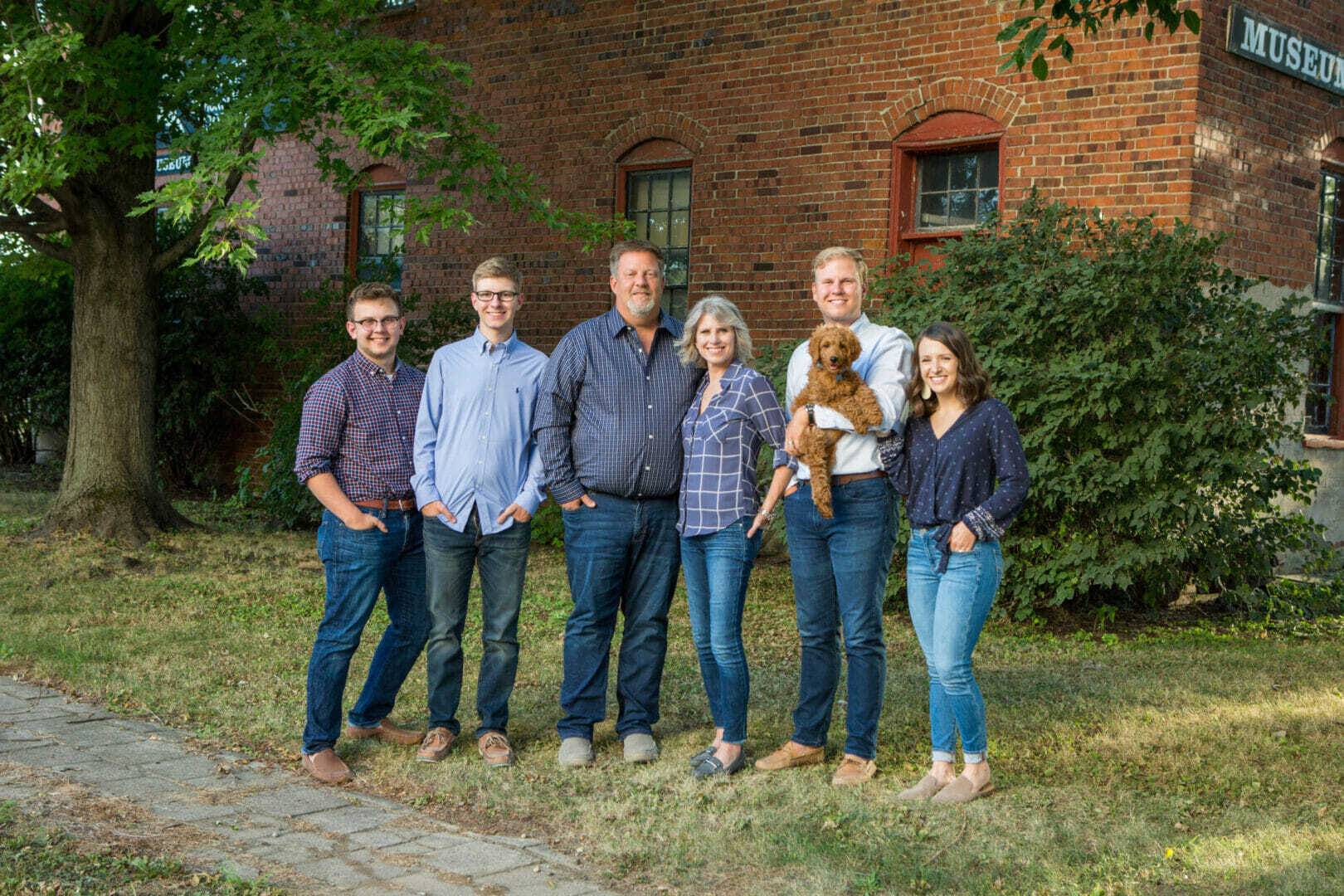
Producing corn, soybeans and pork on a farm is commonplace in Iowa, where livestock feed has been the primary use of grain crops throughout that state’s 175-year history. Families, like the Jacobsens of Dows in Franklin County, are proud of their farming legacy.
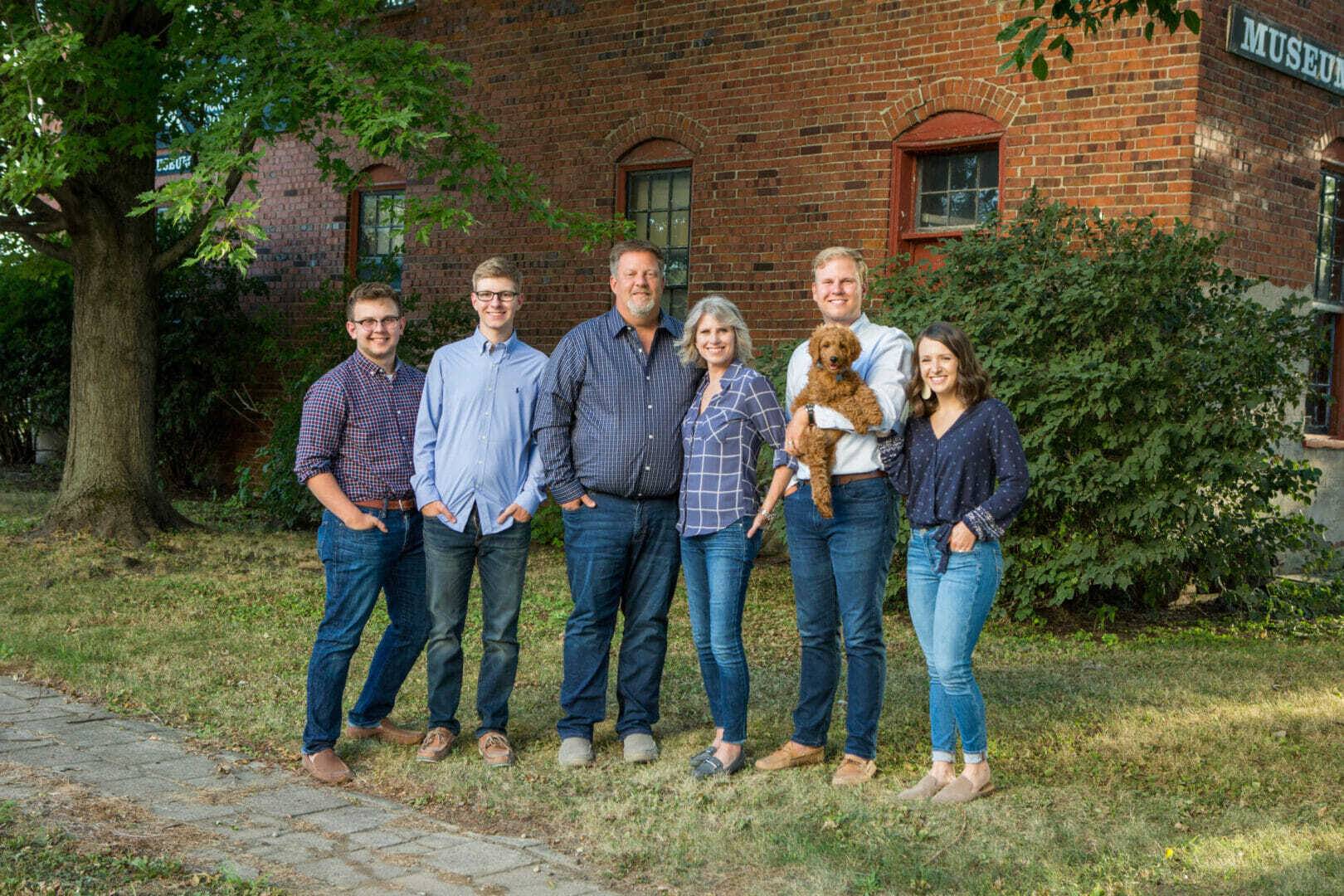
The Jacobsen Family Doug and Carolyn Jacobsen began growing seed beans for Latham Seeds in the 1970s. Their Iowa Century Farm is located one mile from where their son, Corey, and his wife, Kim, farm. Corey began growing seed beans in 1986 when he rented his first farm. Corey and Kim’s oldest son, a fifth generation Iowa farmer, began growing Latham seed beans in 2018.
“I appreciate the opportunity to raise Latham seed beans because most years we get access to newer genetics a year earlier than if we raised soybeans just commercially. I like seeing what’s new in the lineup,” says Corey. “It’s fun visiting with everybody in the fall when we deliver beans to the plant. Plus, it’s nice to know we can pick up the phone or stop by the office whenever we have questions about production or want input.”
Corey has been working toward his goal of farming since he graduated from high school. While studying ag business at Iowa State University (ISU), he helped plant four crops and maintained his breeding-to-finish swine operation. Corey traveled home each weekend to do chores and made countless other trips whenever needed for breeding or farrowing.
“I met Corey at the 1985 Franklin County Fair where he was showing pigs and I was working in the Extension office,” says Kim, who grew up on a farm south of Coulter and enjoyed showing horses in 4-H. It’s only natural their three sons would become showmen.
When Corey graduated from ISU in 1990, he began working at Brenton Bank in Clarion. One year later he started at Dows United Bank & Trust. Corey retired as bank president in 2000, and then he and Kim began farming full time. Kim also retired after teaching high school math and coaching volleyball and track for 10 years at Clarion-Goldfield Dows. Their more flexible schedules allowed their family to spend more time on their pork operation.
“Pork is truly a family project that we all enjoy,” says Kim. She and Corey custom-finished pigs for years and raised show pigs. Now they run an independent wean-to-finish operation. “Raising livestock taught our boys day-to-day responsibility that many other activities can’t provide. They learned that it takes teamwork to be successful and to accomplish what needs to be done.”
When their boys were in middle and high school, the Jacobsen family participated several livestock shows annually including: the Iowa State Fair, Ak-Sar-Ben, World Pork Expo, National Barrow Show, Sioux Empire in South Dakota, Iowa State University’s Block & Bridle, as well as numerous county and state 4-H and FFA shows. Ben had the honor of showing the Reserve Champion FFA Market Hog at the 2013 Iowa State Fair.
“Through 4-H, our boys learned skills they use on the farm also such as welding, woodworking, small engines, along with the communication and record keeping,” says Kim. “Now that they’ve all graduated from high school, I love to see our sons use their skills and continue to educate others about agriculture. Caleb won the Outstanding Agriculture Exhibit by ISU College of Agriculture and Life Science at the Iowa State Fair for his project teaching the truth of GMO’s. Matt is known as the ‘farm kid’ and go-to resource at college. He has skills in welding, woodworking, painting and general carpentry that most other students do not have. He laughs at all of this, especially the time he was a hero changing a gas tank on a gas grill, much to the amazement and awe of others. He also educates classmates and others in the city about livestock and agriculture.”
Matthew will graduate in May 2022 from Harvard College in Cambridge, Massachusetts, with a degree in Molecular and Neurological Biology. He has been a part of the Harvard Curling Club, John Adams debate society and Harvard Pro-Life while keeping up with research projects. Matthew plans to continue research for another year and then attend medical school.
The Jacobsen’s youngest son, Caleb, is a freshman majoring in Ag business at Iowa State University. He enjoys being active in the Ag Business Club and the SALT network through Cornerstone Church. Caleb is following the steps of his oldest brother, Ben, who graduated from ISU in 2018 with a degree in ag business. Ben farms with Corey and Kim. Frances is a Talent and Acquisition Specialist for Boston Scientific, working from their home in Ames. They are expecting their first child in June.
“We feel blessed to have our children grow up on the farm learning the value of honesty, hard work and sacrifice to accomplish goals,” says Kim. “Now the next generation will grow up farming in a community that has been so supportive. We couldn’t ask for anything more.”
During this time of transition, Corey and Kim are freeing up their schedules to make more time for travel. Corey had served on the Dows school board for 20 years and retired when the school district merged. Kim has relinquished most of her off-farm obligations but continues to serve on the Iowa Specialty Hospital Board. They enjoy following the Iowa State Cyclones to Bowl games and other destinations. They have greatly enjoyed making spontaneous trips and have especially enjoyed visiting Matt in Boston.
“We love traveling, trying restaurants, experiencing other cultures and visiting farming operations in other places,” says Kim. Today they’re sharing with us one of their favorite game day recipes of Sausage and Cheese Egg Roll Wraps.
-
Latham Hi‑Tech Seeds
Start the Season Right by Planting the Right Genetics

With the 2022 planting season right around the corner, it’s time to focus on the one thing that will help you capture the most ROI in each field.
Field-by-field product placement is key to maximizing yield – and in turn – profit. Research shows plant genetics account for a 20% difference in yield. This means you could raise 12 more bushels of soybeans and 40 more bushels of corn PER ACRE simply by paying closer attention to your crop placement.
Below are three factors to consider when double-checking your crop placement for 2022:
- Study Field x Field® Ratings. Look at the Field x Field Ratings in the Latham® Product Guide for corn and soybeans. These charts simplify where you should place hybrids and varieties. A “1” rating means it’s a great fit for a particular environment; a “3” rating means you should not plant that product if your field conditions match that description. Your Latham Dealer has seen most of our products in environments, so call him or her if you have additional questions about where to place a particular product.
- Stick to the plan. If your seed dealer has provided you with a Field x Field plan, organize your seed shed so you can stick to the plan. Subscribers to Latham Seeds’ Data Forward® program receive a crop plan book, which you can keep in your planter tractor. It’s a good practice to double check that the right seed gets in the planter. If planting conditions change in a particular field, then take the time to move products. It will be worth an hour of your time to capture the extra $150 to 200 per acre in profit potential.
- Match Genetics to Management. If a certain corn product is described as “likes high management,” then you should not place that product in a field with poor fertility levels. Your seed dealer may not know your fields’ fertility levels unless you share it. That information is critical for accurate product placement as some genetics can handle tough fertility situations and others will fall apart in those environments. Also make sure you aren’t overplanting or underplanting each hybrid. Look at the “suggested populations” in our Product Guide, as well as the “Ear Type” rating and our stress wheel poster. We want to help you capture yield!
If you’re planting soybeans early or at the same time your planting corn, treat the seed with SoyShield® to protect it from early season fungal diseases. Seed treatment also gives seedings an early advantage. Even when using a quality seed treatment, plant fields with the heavy soils that remain wet and cold last or at least the soils have warmed. This will help your soybeans better ward off root diseases all season long.
A successful 2022 crop year begins with having a plan and sticking to it! Take the time now to double-check that you properly matched plant genetics with soil conditions. Our dealers are also happy to talk through field placement as well. If you have further questions or want to chat with our agronomists call: 1.877.GO.LATHAM (1.877.465.2842).
